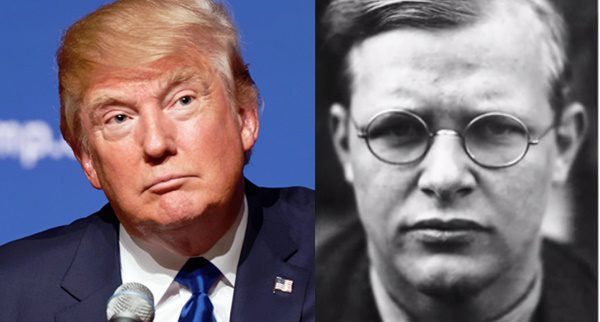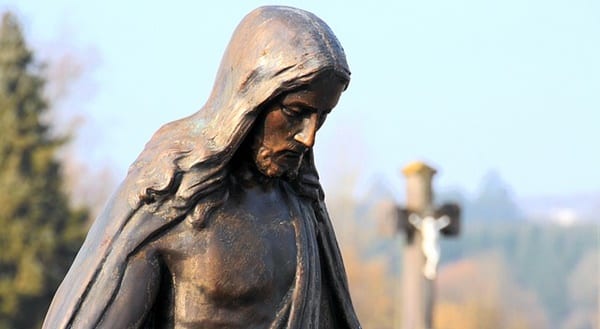I have a conservative family member whom I love. We frequently discuss politics and religion. Over the years, his church has become more liberal than he is comfortable with, as some in his congregation believe we are at a “Bonhoeffer moment” in the United States because Trump has encouraged racism and white supremacy. “If they act on this ‘Bonhoeffer moment,’” he said, “then they better be right.”
Are we at a Bonhoeffer moment? Donald Trump pardoned ex-sheriff Joe Arpaio last Friday. Arpaio was convicted of criminal contempt because he violated a court order created to stop him from violating the constitutional rights people suspected of being undocumented immigrants.
Trump suggested that Arpaio was convicted for “doing his job.” Apparently, Arpaio’s job as a government official was to violate the constitution by employing racist policies throughout his jurisdiction.
The United States’ Department of Justice investigated Arpaio and came to this conclusion in their 22 page document describing Arpaio’s violations of the Constitution: “Specifically, we find that MCSO (Maricopa County Sheriff’s Office), through the actions of its deputies, supervisory staff, and command staff, engages in racial profiling of Latinos; unlawfully stops, detains, and arrests Latinos; and unlawfully retaliates against individuals who complain about or criticize MCSO’s policies or practices, all in violation of Section 14141” of the Constitution.
The pardoning of Arpaio tells us something significant about Donald Trump. He didn’t just pardon Arpaio because Arpaio was simply “doing his job.” Trump pardoned Arpaio because Arpaio is Trump’s political model. Mimetic theory claims we all model ourselves after those we admire and want to be like. Trump wants to be like Arpaio. Arpaio was Trump long before Trump came on the scene. Both want to keep “law and order,” and if that means acting unconstitutionally in the name of a perceived greater good, so be it. Trump pardoned Arpaio because he sees himself in Arpaio. And Trump doesn’t want to see himself in a jail cell, so he pardoned Arpaio.
Empathy is a good thing. Personally, I don’t want to see anyone in jail, including Arpaio. I’d rather Arpaio find healing through therapy than punishment through prison. And I’d like to see Trump’s circle of empathy expand to those African Americans and Latinos who have been sentenced to jail for allegedly committing nonviolent crimes, like the many families torn apart for drug offenses – offenses that largely do not affect white people. As Michelle Alexander has shown in her book The New Jim Crow, the “War on Drugs” is in reality a war on black people.
But it’s unlikely that Trump’s circle of empathy will expand. Empathy is a good thing, but it occurs in stages. Trump is at an early stage in empathy. In the early stages, it’s natural to empathize with people like us. Trump empathizes with Arpaio because they have the same belief system that immigrants are destroying our country and we must defeat them in order to “make America great again.”
White nationalists love this kind of talk. It gives them hope. Trump pardoned a government official who once stated that being associated with the KKK was an “honor” because it meant he was doing something. Apairo also claimed on video that his “Tent City” jail was a concentration camp. When a reporter confronted him about that comment, he denied ever making it. Instead, he claimed, the inmates love Tent City!
Whenever Trump gets caught speaking the horrific truth about what he really believes, he covers it up in lies, just like Arpaio. His infamous comment after the KKK marched in Charleston that there was “violence on all sides,” encouraged the KKK because it put them on the same level the counter-protesters. Trump’s pardoning of someone who associated himself with the KKK only gives more evidence that Trump is aligned with white supremacists.
And so, I go back to the conversation with my beloved family member who wonders if we truly are at a “Bonhoeffer moment.” Those of us who think we are in this moment need to remember that Bonhoeffer joined an assassination attempt on Hitler.* We are not at that moment. We are at the Bonhoeffer moment of resisting nonviolently. Like Bonhoeffer, we must resist racist policies that encourage white supremacists.
Trump’s model is Arpaio, but Bonhoeffer’s model was Jesus. He knew Jesus intimately and wanted to be like him. He knew that the image of God was at stake in Nazi Germany. And it’s at stake here in the United States. Bonhoeffer also knew that the image of God was not just in people like him; it was also in his enemies. That’s why he was committed to nonviolent resistance. Bonhoeffer was guided by Jesus’ call to love all people, including his enemies. For Bonhoeffer, violence against anyone, including Hitler, was not a good tool to use as a last resort. It was a failure that made him guilty. According to leading Bonhoeffer scholar Renate Wind, before he planned to commit violence, Bonhoeffer “would deliberately leave the church. He left no doubt that any use of force is and remains guilt. But he insisted that there can be situations in which a Christian must become guilty out of love of neighbor.”**
We are not in a Bonhoeffer moment, if by that we mean assassination. We are in a Bonhoeffer moment in that we need to continue to resist Trump’s racist policies. Bonhoeffer refused to be a collaborator with the racist policies of his generation. Christians during Trump’s presidency must do the same.
Stay in the loop! Like Teaching Nonviolent Atonement on Facebook!
Images: Donald Trump, Wikimedia, Creative Commons License. Deitrich Bonhoeffer, screenshot from youtube.
*Some recent Bonhoeffer scholarship claims that he didn’t join an attempt to assassinate Hitler. While this new scholarship deserves more study, in this article I follow the popular and scholarly work that claims he did join an attempt to violently remove Hitler. Whichever way we interpret Bonhoeffer’s life, Jesus thoroughly eschewed violence. Even if we assume Bonhoeffer did join an assassination attempt, we must follow Bonhoeffer by not thinking violence was a good thing. Rather, it made him guilty and in need of forgiveness.
**See Wind, Dietrich Bonhoeffer: A Spoke in the Wheel, 144.












